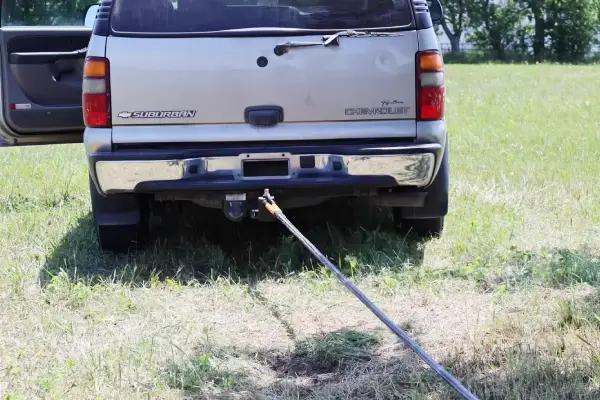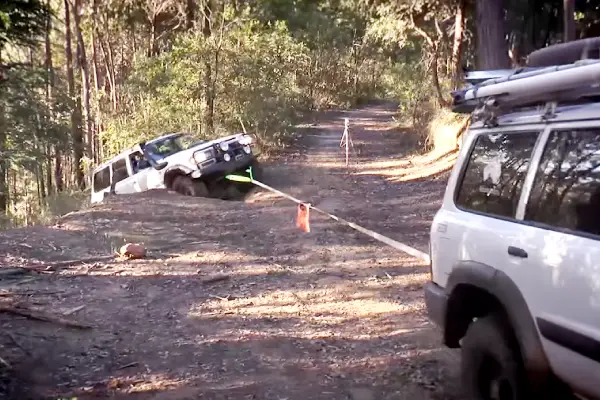Sometimes, your car may get into an unexpected accident or stall on a busy road where you need to tow it to a safe location or a mechanic.
In such situations, you may be tempted to resort to the easiest and fastest option, towing your car with a rope. However, is it really okay to tow a car with a rope in order to bring it to a safe spot or to a mechanic?
Towing a car with a rope is generally not advisable due to the various safety risks involved, such as the inadequate strength of ropes, limited maneuverability, and more. Using a tow rope should be a last resort, limited to very short distances at low speeds on local roads and never on highways.
We will discuss why towing with a rope is not recommended and explore safer alternatives to assist you in times of crisis.
Towing a Car With a Rope: 4 Reasons Not to Do It

Towing a car with a rope isn’t recommended for several reasons, such as:
- Inadequate strength of ropes
- Limited maneuverability
- Inadequate braking mechanism
- Potential for legal consequences
1. Inadequate Strength of Ropes
When towing a car, avoiding using a rope is crucial due to its inadequate strength and increased risk of fraying and breakage. Typical ropes lack the necessary robustness to withstand the strain of towing, especially on diverse terrain with hills and valleys.
However, these ropes may not be able to handle the varied conditions effectively. The vehicle’s weight being towed further exacerbates the problem, as ropes are more likely to fray and break under heavier loads. This poses a significant safety risk to the towed vehicle and other drivers on the road.
To ensure a safer towing experience, look for a professional towing service with the expertise and equipment needed for secure and reliable hauling.
2. Limited Maneuverability
It is difficult to make quick and precise maneuvers when towing a car with a rope. This becomes especially problematic in urban environments where navigating tight turns, parking lots, and intersections requires agility and control.
Towing with a rope restricts the movement of both the towing and towed vehicles, making it difficult to navigate through traffic and leading to potential collisions. Additionally, the lack of flexibility in towing with a rope can damage the vehicles involved, as sudden jerks or uneven forces can strain the towing points.
3. Inadequate Braking Mechanism
When you tow a car with a rope, the towed vehicle doesn’t have its own braking system to assist in stopping or slowing down. This means that all the responsibility falls on the towing vehicle’s brakes to bring both vehicles to a halt.
In situations that demand sudden stops or changes in speed, this inadequate braking mechanism can lead to accidents.
Instead, consider opting for a flatbed towing service to address this concern and ensure a safer towing experience. Flatbed towing provides a more secure and controlled transport, eliminating the reliance on the towed vehicle’s braking system and minimizing the risk of accidents during sudden stops or speed changes.
4. Potential for Legal Consequences
Using a rope to tow a car can result in significant legal consequences. While some states may allow this practice under certain conditions, the legality is often unclear and subject to local regulations.
A clear understanding of the towing guidelines and laws is essential to avoid fines, penalties, and legal responsibilities.
Most states emphasize the importance of using appropriate towing equipment to prevent injuries and accidents. Ignorance of these regulations or assuming a one-size-fits-all approach to towing legality can lead to legal complications.
How much weight can a tow rope support when towing a vehicle?

When towing a vehicle, the weight a tow rope can support depends on its breaking strength. For instance, a standard tow rope with a breaking strength of 23,000 lbs is suitable for vehicles up to 7,500 lbs.
When choosing a tow rope, a general guideline is to select one with a breaking strength approximately three times the weight of the vehicle you are pulling. So, if your vehicle weighs 4,000 lbs, a tow rope capable of breaking 12,000 pounds would be appropriate.
What is the most appropriate location to attach a tow rope to a vehicle?
When attaching a tow rope to a vehicle, it is best to secure it as directly as possible between the vehicles. Opt for connection points like the frame, tow hook, or a class 2 or 3 trailer hitch for maximum stability and safety.
Avoid attaching the tow rope directly to the bumper, as it may not withstand the forces involved in towing. For added security, consider looping the end of the tow rope around the axle, ensuring a strong and reliable connection as you tow the vehicle.
What alternative method for towing a car instead of using a rope?
When towing a car, it is recommended to opt for safer methods such as tow straps, tow bars, or professional towing services instead of using a rope. Tow straps and tow bars are durable and designed for secure attachment, providing stability and reducing the risk of equipment failure.
On the other hand, professional towing services offer a high level of expertise and specialized equipment to ensure a safe and efficient towing process.
Additionally, a professional towing company has tow vehicles equipped with heavy-duty shocks that enhance stability and safety during towing.
Choosing these alternatives minimizes the chances of damage to the vehicles involved and ensures a safer and more controlled towing experience.
Be Safe and Secure when Towing
When towing your vehicle with rope, you must consider the potential risks. The inadequacies in strength, maneuverability, and braking mechanisms pose significant safety concerns.
To ensure a secure and controlled towing experience, explore safer alternatives like tow bars, tow straps, or professional towing services.
Whenever you need towing service in Santa Clara, you can count on Santa Clara Towing. We are the most experienced and reputable towing company, available 24 hours daily. Call 669-228-5951 to get in touch and ensure a reliable and prompt solution to your towing needs.
